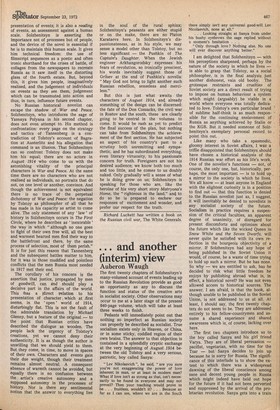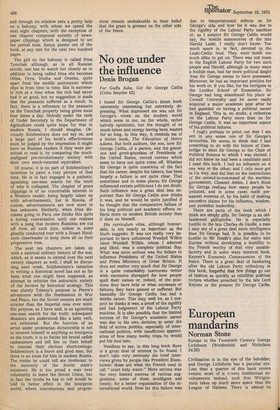. . . and another (interim) view
Auberon Waugh
The first twenty chapters of Solzhenitsyn's many-volumed account of events leading up to the Russian Revolution provide as good an opportunity as any to discuss the function and status of the creative arts in socialist society. Other observations may occur to me at a later stage of the present 640-page volume, which will take at least three weeks to finish.
Pedants will immediately point out that nothing so imperfect as Russian society can properly be described as socialist. True socialism exists only in Heaven, or China, or in some sticky, coddled region of their own brains. The answer to that objection is contained in a splendidly cryptic exchange at the very beginning of August 1914 between the old Tolstoy and a very serious, patriotic, boy called Sanya:
"Lev Nikolaevich ", he said, "are you sure you're not exaggerating the power of love inherent in man, or at least in modern man? What if love isn't as strong as that, isn't necessarily to be found in everyone and may not prevail? Then your teaching would prove to be . . . fruitless, wouldn't it? . . . Because as far as I can see, where we are in the South
there simply isn't any universal good-will Lev Nicolaevich, none at all"
. . . Looking straight at Sanya from under his bushy eyebrows the sage replied without a moment's hesitation . .
" Only through love ? Nothing else. No one will ever discover anything better."
I am delighted that Solzhenitsyn — with his perceptions sharpened, perhaps by the nature of the society in which he lives — is able to grasp that Tolstoy, as a social philosopher, is in the final analysis just another dishonest, vain old booby. The grotesque restraints and cruelties of Soviet society are a direct result of trying to impose on human behaviour a system which might (arguably) be viable in a world where everyone was totally dedicated to love. Tolstoy's own particular brand of sublime half-think is as much responsible for the continuing enslavement of Russia as anything achieved by Stalin or the KGB. But it needed someone of Solzhenitsyn's exemplary personal record to point this out.
Like many who take a spasmodic, gloomy interest in Soviet affairs, I was a trifle disappointed that Solzhenitsyn should have chosen a historical analysis of the 1914 Russian war effort as his life's work. One of the novelist's functions — not, of course, the only one, but, historically, perhaps, the most important — is to hold up a mirror to the society in which he lives. We all know — at least anyone in England with the slightest curiosity is in a position to find out — that this function is denied to the Russian novelist just as, I suggest, it will inevitably be denied to novelists in any socialist society of the future. Socialism in practice requires a suspension of the critical faculties, an apparent degree of unanimity, of disregard for present discomforts and optimism about the future which like the wicked Queen in Snow White and the Seven Dwarfs, will never quite be satisfied with its own reflection in the bourgeois objectivity of a mirror. If Solzhenitsyn had any hope of being published in the Soviet Union it would, of course, be a waste of time trying to hold up such a mirror. But he has none. So why — we are entitled to ask, has he decided to risk what little freedom he enjoys by publishing abroad what is, in effect, a historical novel? He was not even allowed access to historical sources. The answer, I am afraid, is that the book, although unable to be published in the Soviet Union, is not addressed to us at all. At least, I should say, the first twenty chapters do not seem to be. They are addressed entirely to his fellow-countrymen and assume a shared experience and shared awareness which is, of course, lacking over here.
The first two chapters introduce us to the boy called Sanya and his girl friend Varya. They are of liberal persuasion — pacifist, vegetarian, with no time for the Tsar — but ` Sanya decides to join up because he is sorry for Russia. The significance of this interlude is to show the extent to which there was a widespread dawning of the liberal conscience among sane and decent young people in Russia which might indeed have held out hope for the future if it had not been perverted and suppressed by the arrival of the proletarian revolution. Sanya gets into a train and through its window sees a pretty lady on a balcony, with whom we spend the next eight chapters, with the exception of one chapter composed entirely of newspaper clippings which is designed to set the period tone. Sanya passes out of the book, at any rate for the next two hundred pages.
The girl on the balcony is called Irina Tomchak although, as in all Russian novels, one has to watch her closely as in addition to being called Irina she becomes Drina, Orya, Irusha and Orenka, quite apart from the middle patronymic which slips in from time to time. She is extremely rich at a time when the rich had never had it so good, but no suggestion is made that the peasants suffered as a result. In fact, there is a reference to the peasants on the Tomchak property being given meat four times a day. Nobody under the rank of Under Secretary in the Department of Agriculture could quite hope for that in modern Russia, I should imagine. Obviously Solzhenitsyn does not say so, and a large part of his book's effectiveness must be judged by the impression it might have on Russian readers if they were per mitted to read it, by comparing the muchmaligned pre-revolutionary society with their own much-vaunted equivalent.
Of course, it is no part of Solzhenitsyn's intention to paint a rosy picture of that time. He is in fact engaged in a pathetic, agonising one-man search for the truth of why it collapsed. The chapter of press clippings is of no conceivable interest to a Western reader, being largely taken up with advertisements, but in Russia, of course, advertisements are now more or less unknown. Similarly, when Irina discusses going to Paris one thinks this quite a boring conversation until one realises with a pang that modern Russians are cut off from all such joys, unless in some ghastly conducted tour with a Stuart Hoodstyle cheerleader to keep them all on their progressive toes.
The next ten chapters are taken up with a satirical military history of the war, which, as it seems to extend over the next twenty chapters as well, I shall be discussing next week. Solzhenitsyn's intention in writing a historical novel has not so far been what one might have supposed, an attempt to criticise the autocratic society of the Soviets by historical analogy. This was plainly Tolstoy's purpose in Pierre's adventures with the freemasons in War and Peace, but the Soviet censors are much stricter than the Imperial ones ever were. His purpose, as I have said, is an agonising one-man search for the truth: subsequent disasters are understood like a latin verb, not reiterated. But the function of an artist under proletarian dictatorship is not to interest himself in anything so bourgeois as the truth; it is to flatter his brutal oafish taskmasters and tell lies on their behalf to conceal their obvious shortcomings. Solzhenitsyn is a brave and good man, but there is no room for him in modern Russia. The truths he could tell are irrelevant to the enormity of the Soviet state's existence. He is too proud a man ever voluntarily to leave the Soviet Union, but in fact the truths he has to tell would be told to better effect in the bourgeois world, where nincompoops and progres sives remain unshakeable in their belief that the grass is greener on the other side of the fence.



































 Previous page
Previous page